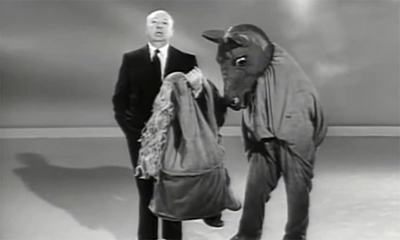
As part of the “For the Love of Film” blogathon, I’ll be taking a look at Alfred Hitchcock’s contributions to his celebrated anthology series Alfred Hitchcock Presents. I’ll be looking at some of the episodes of the classic show that he directed. The “For the Love of Film” blogathon this year is raising money to keep one of Hitchcock’s earlier works, The White Shadow (which he wrote, edited, designed and assistant-directed), available on-line and streaming for free. It’s a very worthwhile cause and you can donate here.
The Horse Player actually makes for a nice conclusion to our run of Alfred Hitchcock Presents reviews. It aired in 1961, towards the end of the sixth season of the anthology show, a year before the show would be rebranded The Alfred Hitchcock Hour. It was the second last half-hour show that Hitchcock personally directed, but is generally agreed to be much stronger than his final effort, a morality play titled Bang! You’re Dead. Instead, The Horse Player is an enjoyable and engaging meditation on those cardinal virtues of faith, hope and charity.
I’m constantly impressed with the versatility of the format of the show. It seemed like Hitchcock allowed for virtually any story that could be told within a half-an-hour. We’ve had noir-tinted stories like Revenge, existential fantasy in The Case of Mr. Pelham, comedy in Back for Christmas and lots of others deviating between thriller, drama and comedy. The Horse Player is a bit difficult to catalog. It’s light, but it’s not a comedy. On the other hand, it’s not necessarily as heavy as one might expect a drama to be. Instead, it’s just a good story.
In fact, one can almost judge how good a story it is by how relevant it remains today, half-a-century after it was originally broadcast. Indeed, I’d argue that it’s even more timely now than when it originally aired. Sure, the Catholic Church has arguably been in decline since the Second World War, at least in the United States and Western Europe, but it is much more pronounced now. It’s not too difficult to imagine many modern priests in a situation quite similar to Father Amion, unable to pay for necessary repairs to church property, managing congregations that seem much less enthusiastic than they once were.
Hitchcock frames a rather wonderful introductory sequence, illustrating just how bad things are in Father Amion’s church. It’s a nice little sequence that manages to make it clear just how deeply in trouble this branch of the Catholic Church must be. It’s nicely shot, capturing the essence of Father Amion’s problems in a matter of seconds, without seeming too heavy-handed or too forced. I know I’ve occasionally been a bit harsh on Hitchcock as a director, but he does have a wonderful knack, and one can pick it up (even faintly) in all his work for the show.
There are, of course, better examples of his direction to be found in the seventeen episodes he directed, but I think that the introductory sequence is a rather stately and elegant way for Hitchcock to confirm his presence without overstating himself, or drawing too much attention to his work. The rest of the episode is pretty much a collection of talking heads, with a minimum amount of room for a director to do anything, save trying to avoid getting in the way of the story at hand.
There’s a lot of clever stuff at the middle of The Horse Player, centring around discussions about faith including Father Amion and his latest parishioner, Mr. Sheridan. Sheridan seems to have discovered the power of prayer, and not in some vague philosophical sense, but rather a more practical application. Father Amion is put in a paradoxical position of desperately needing the donations from the gambler (“I don’t think I’ve seen a ten dollar bill in a mid-week collection since before the war,” he confesses) and yet condemning the behaviour.
“I suppose, a guy like you, you don’t go in for gambling and that,” Sheridan confesses, actually seeming remarkably cool about the whole thing. I know that God has clued him in on various winners, but I’m not sure I’d take lip from somebody I’m helping so much. Father Amion is polite, but firm. “Mr. Sheridan,” he states, “I’m not sure that you understood my message. I said that prayer could work miracles – but not for such selfish aims.”
Of course, as he needs the money increasingly desperately, Father Amion finds himself gradually compromising, his criticism fading into plausible deniability. “There’s no need to tell me where your donation comes from, Mr. Sheridan,” he tells the gambler at one point. “I thank you for it, but I’d rather not discuss the source.” It’s interesting to contemplate at what point culpability begins – at what point Father Amion’s principles require rejecting the money to clear his conscience. It’s also fascinating to wonder if prayer can ever truly be selfish. After all, even the most altruistic individuals pray to cleanse their souls, so what’s wrong with at least confessing the selfishness?
The dialogue sparkles, which is probably a large part of the appeal of the episode, given it’s nothing more than an extended series of conversations. My personal favourite line comes when Father Amion tries to explain how everybody praying for a winner would create an unfair situation. Mr. Sheridan contemplates the logic of the argument for a moment, before offering his own response, “Yeah, it would be tough – that is if everybody prayed for a winner. Only they don’t, see. Everyone ain’t wise to this prayer racket, Father. And that’s their hard luck, ain’t it?” Beautiful.
The central performances are great. I am consistently impressed by the caliber of the talent that Hitchcock drafted for his television show. Here it’s Claude Rains as Father Amion, who is perfectly cast as a torn man. As far as crises of faith go, this isn’t the most severe that I’ve seen – but then, that’s part of the fun. Part of me finds it deliciously ironic that Father Amion must believe that God favours a guy who prayed once over a man who has been praying all his life, and Rains perfectly embodies that frustration.
Ed Gardner is great as Mr. Sheridan, the parishioner who actually seems like a really decent guy who is making the most of his new-found wealth and who just wants to do right by an institution he believes has been quite kind to him. He seems just a little frustrated (and yet never upset) that Father Amion simply won’t accept his well-intended assistance. The ending is actually quite fantastic, and it’s an ending that isn’t a sudden swerve or a mad twist, but instead is a rather thoughtful final note on what has been a rather thoughtful little vignette.
The Horse Player is clever, thoughtful and fun drama. It is, in a way, a show that captures the very best of Alfred Hitchcock Presents, and so provides the perfect note of which to conclude our trip down memory lane.






